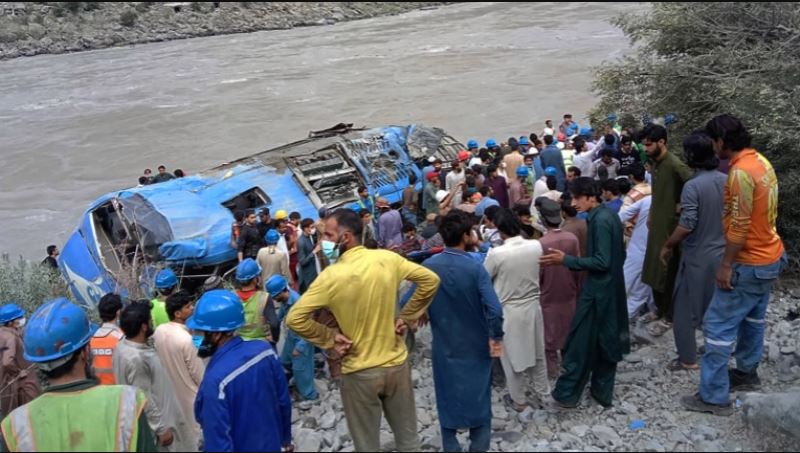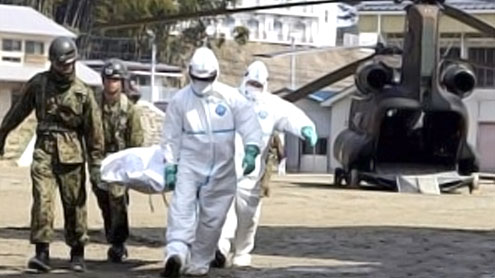Stepping back from its earlier position that the blast on Chinese workers’ bus was caused by accidental leakage of gas, the government on Thursday said it could potentially be a terrorism incident as traces of explosives had been detected on the wreckage of the bus and at the blast site.
Information Minister Fawad Chaudhry said in a Twitter posting: “Initial investigations into Dasu incident have now confirmed traces of explosives, terrorism cannot be ruled out.”
The development came as China announced that it was sending a team to Pakistan to deal with the aftermath of the incident.
“Today China will send a cross-departmental joint working group to Pakistan to help with relevant work,” Chinese foreign ministry spokesman Zhao Lijian said at a media briefing in Beijing. No effort would be spared to “find out what happened, conduct in-depth assessment of security risks, and do our utmost to ensure the safety of Chinese personnel”, he said.
China postpones meeting of CPEC Joint Coordination Committee
“We have asked the Pakistani side to lose no time in conducting a thorough investigation, properly transfer and treat the wounded, strengthen security measures, eliminate security risks, and ensure the safety and security of Chinese personnel, institutions and projects in Pakistan,” he said.
Pakistan’s Foreign Office, while giving the government’s initial position on the incident on Wednesday, had blamed “leakage of gas” caused by a “mechanical failure” for the blast on the bus carrying about 30 Chinese workers from the workers’ camp to the under-construction tunnel site of the 4,300-megawatt Dasu hydropower project in Upper Kohistan, Khyber Pakhtunkhwa. The bus fell into the ravine after the blast.
Thirteen people — nine Chinese nationals, two personnel of the Frontier Constabulary and two locals — were killed and 28 others injured in the incident.
Foreign Minister Shah Mahmood Qureshi too in his conversation with Chinese counterpart Wang Yi on the sidelines of SCO Summit in Dushanbe, according to a statement on Chinese foreign ministry’s website, insisted that it was an accident and “no background of terrorist attack” had been found.
It was a rare occasion that Pakistan and China differed publicly on such a sensitive issue.
Mr Lijian while speaking at a foreign ministry briefing in Beijing on Wednesday had declared it a “bomb attack”. He said China was “shocked by and condemns” the attack in which Chinese and Pakistani workers were killed.
“China has asked the Pakistani side to thoroughly get to the bottom of the truth as soon as possible, arrest the perpetrators, severely punish them and earnestly protect the safety of Chinese personnel, institutions and projects in Pakistan,” Mr Lijian had said.
A source at the Chinese embassy had also privately told this correspondent that they believed the blast had been caused by an improvised explosive device.
Foreign Minister Yi, in his conversation with Mr Qureshi, hoped that Pakistan would quickly find out the cause of the incident and prevent recurrence of such incidents.
“If it is a terrorist attack, the criminals must be immediately arrested and severely punished. Lessons should be learned from the incident, and the security measures for China-Pakistan cooperation projects should be further strengthened to ensure the safe and smooth operation of all projects,” he said, according to the Chinese foreign ministry’s statement.
Fawad Chaudhry had said that Prime Minister Imran Khan was himself monitoring investigations in the case, which were also being closely coordinated with China.
“We are committed to fight menace of terrorism together,” he said.
Beijing, meanwhile, reacted sharply to the incident by postponing a meeting of the Joint Coordination Committee (JCC) of China-Pakistan Economic Corridor (CPEC) scheduled for Friday. The meeting was to be held though video link.
CPEC Authority Chairman Lt Gen (retd) Asim Bajwa announced the postponement of the meeting on Twitter. “JCC-10 meeting on #CPEC which was scheduled to be held on 16th July 21, has been postponed to a later date after Eid. Fresh date will be shared as finalized. Meanwhile, preparations continue,” he said.
Mr Lijian said the Chinese government was taking the incident, which resulted in heavy casualty, very seriously and the Communist Party and state leaders had given “important instructions right away.”
Beijing has on multiple occasions in the past raised concern about the security of their citizens working on various projects in Pakistan. Islamabad has always assured the China that protecting the Chinese was a national responsibility.
In a related development, a Chinese delegation led by Ambassador to Pakistan Nong Rong visited the Barseen area in Upper Kohistan on Thursday.
According to sources, a joint investigation team, comprising experts from the army, police, Counter-Terrorism Department and Bomb Disposable Squad, found traces of explosive around the area where the coach had exploded and plunged into the Indus riverside on Wednesday.
The Chinese delegation, which had arrived at Dasu at about 12 noon, was received by Inspector General of police Muazzam Jah Abassi and Commissioner of Hazara Riaz Mehsud.
The Chinese delegation visited the explosion site and then moved to the Barseen camp where Chinese workers are stationed.
Amb Rong also inquired about the health and safety of the Chinese engineers and workers working at the Dasu hydropower project.
The Chinese delegation, which left Dasu for Islamabad at about 4pm, also questioned the investigation team, the IG and the commissioner about the incident.
Senior officials of KP government and the army, including IG Abassi and DIG Mir Wais Niaz, also visited the blast site and the Barseen camp and enquired after the health of the Chinese engineer and workers.
Since the bus tragedy, the security of Chinese engineers and workers executing development projects under the CPEC has been beefed up.
“The mobility of the Chinese nationals working at different projects in Hazara division and Gilgit-Baltistan has been restricted for the time being,” sources said.











